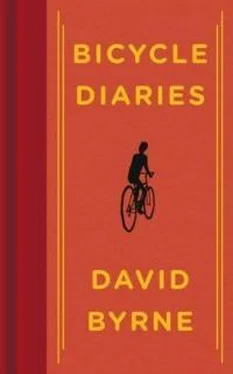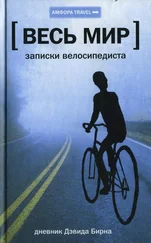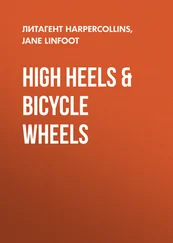When I’m feeling optimistic I believe that the exhilaration, freedom, and convenience I experience as I ride around will be discovered by more and more people. The secret will be out and the streets of New York will be even more the place for social interaction and interplay that they are already famous for. As others have mentioned, the economic collapse of 2008 might be a godsend. A window has opened and people might be willing to rethink the balance of quality of life.
Epilogue: The Future of Getting Around
In a recent New Yorker article (“There and Back Again”) I read that one out of every six American workers commutes more than forty-five minutes to work, each way. A growing number spends even more time—ninety minutes is not that unusual for a commute these days. Though some of these folks use public transportation—commuter trains and subways—there’s a good percentage of solo car riders in there too. It’s unsustainable. Unsustainable means that eventually the behavior will inevitably be changed or modified, either thoughtfully and voluntarily, or as a result of tragic consequences. Either way it will not go on as it is for very much longer.
The fact is that in the twentieth century the automobile was subsidized on a massive scale. The nicely paved roads that go to the tiniest little towns and obscure regions in the United States weren’t built and maintained by GM and Ford—or even by Mobil and Esso. Those corporations benefited enormously from that system. Rail routes to small towns were allowed to wither and die and trucking became, for most goods, the cheapest and sometimes the only way to get products from place to place.
Now I have to admit it’s nice to motor around a continent and stop wherever and whenever one pleases. The romance of being “on the road” is pretty heady, but a cross-country ramble is a sometime thing. It isn’t a daily commute, a way of living, or even the best way to get from point A to point B. In Spain the new high-speed train can get you from Madrid to Barcelona in two and a half hours. By road it takes at least six. If the Spanish government had poured all that money into more freeways you still wouldn’t be able to get there any faster.
In the UK newspaper the Guardian I read that the Pentagon sent a report to the Bush administration in 2004 informing them that climate change is real and that it is more of a threat than terrorism, and will—not might—have massive global political repercussions. They predict a worldwide scramble for survival and for resources that will inevitably result in an almost constant state of war around the globe. Sounds cheery. This came from the Pentagon, not the Environmental Protection Agency!
Riding a bike won’t stop that or many other dire predictions from happening in our lifetimes, but maybe if some cities face the climate, energy, and transportation realities now they might survive, or even prosper—although the idea of prospering seems almost morbid, given that so many unsustainable cities will inevitably flounder through droughts, floods, unemployment, and lack of power. I expect some of the cities I’ve ridden around to more or less disappear within my lifetime—they’re resource hogs and the rest of the continent and world won’t put up with it for long. I don’t ride my bike all over the place because it’s ecological or worthy. I mainly do it for the sense of freedom and exhilaration. I realize that soon I might have a lot more company than I have had in the past, and that some cities are preparing for these inevitable changes and are benefiting as a result.
I recently attended a short talk by Peter Newman, an Australian professor and urban ecologist, who originally coined the phrase “automobile dependency.” He presented a scary graph that showed energy consumption—mainly used in getting around—in many of the world’s large cities. The United States uses the most, with Atlanta—which has sprawled incredibly in recent decades—heading the list. Australia came next, followed by Europe and, at the very bottom, Asia. I would have thought, having seen photos of the massive pollution that has accompanied the Asian economic boom, that Asia would be higher on the list for energy use, but the density of a city—and those cities are very dense—often means that its citizens use less energy in getting around, as well as less energy for heating, cooling, and waste disposal. For that reason New York is actually greener than a lot of cities that, from the look of them at least, with their extensive trees and backyards, appear to be more bucolic and might therefore be assumed to be greener. But a golf course is not green.
The Chinese also ride bikes, or used to, anyway, which kept their energy use down. And they can’t afford central heating or AC. But that’s all changing now as cheap cars are being introduced there and in India—a trend that doesn’t bode well in the long run. It seems unfair to expect the Chinese and the Indians to be smarter about their carbon footprint and pollution than we in the West are, but the fact is if they approach our levels of car use and fossil-fuel consumption the whole planet will become unsustainable.
Why do people do things that seem to be not in their own best interests? Not just the Chinese—all of us. Well, for status, for starters. From a genetic point of view a step up the status ladder is worth more than just about anything else. Think about the mantis who gets eaten immediately after depositing his sperm—genetically he’s actually done okay. The male mantis, the delivery vehicle, is expendable from this point of view—at least if he has done his job. From this perspective, if owning a car improves your image and status, and therefore your mating chances, then the sacrifice—so our built-in instincts tell us—is absolutely worth it. Not really, not ultimately, but that might be what our compasses tell us. And, if an even bigger car proffers even greater status, then sure, get an SUV, or one of those new stretch armored tank-type things.
New York City is making some headway in dealing with traffic congestion, though it is hardly a model city in this respect. A number of European cities—Copenhagen, Berlin, Amsterdam, and Paris—are much further along. But I live here, so I am curious about how big bad New York will deal with this elephant.
The Department of Transportation (DOT) has been adding bike lanes here and there over the last decade. Up till now most of them have been helpful, but many of them are far from what they need to be. In most cases the lanes consist of some white lines between the parked cars and the moving traffic, so vehicles are constantly moving in and out of the bike lanes. In addition, being next to the traffic means that every once in a while, fairly regularly in fact, drivers swerve into the bike lane to stop, unload, or park—or, without signaling, cross it as they turn a corner. One has to be constantly on the alert. I wouldn’t want my kid riding in those lanes.
Adding more bike lanes like those I describe is somewhat perverse because it makes a show of responding to the problem but in a way that, in my opinion, is ultimately destined to fail. Sadik-Khan and others seem to be recognizing this, as the new bike lanes they’ve been adding on Ninth Avenue, Broadway, and down on Grand Street are either completely protected by a concrete curb or are next to the sidewalk, with the parked cars allotted the lane between the bike lane and the moving traffic.
In the words of Enrique Peñalosa, who instituted bike and pedestrian streets and rapid transit in Bogotá when he was mayor, if a bike lane isn’t safe for an eight-year-old child, it isn’t really a bike lane. I tried to get my daughter to ride her bike a little in New York when she was in high school, but it didn’t take—partly for this reason and partly maybe because it wasn’t cool.
Читать дальше









